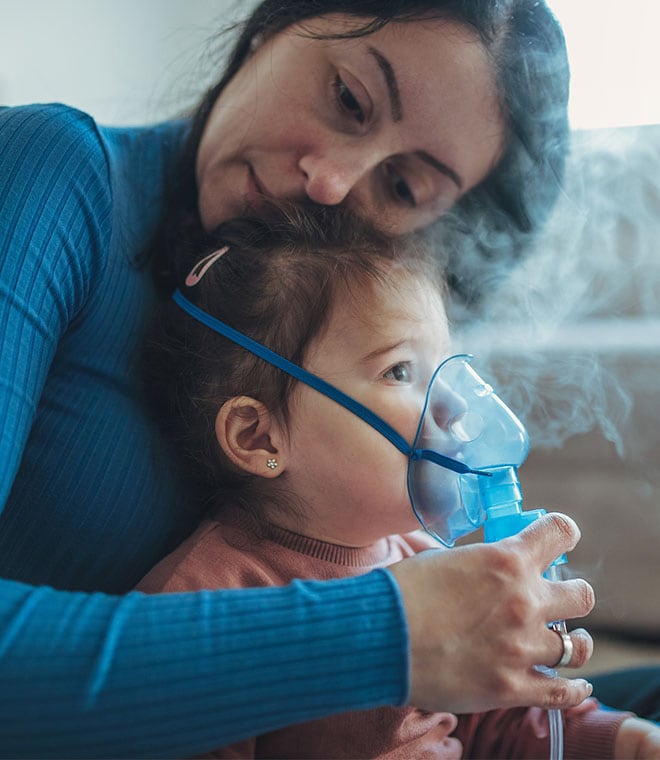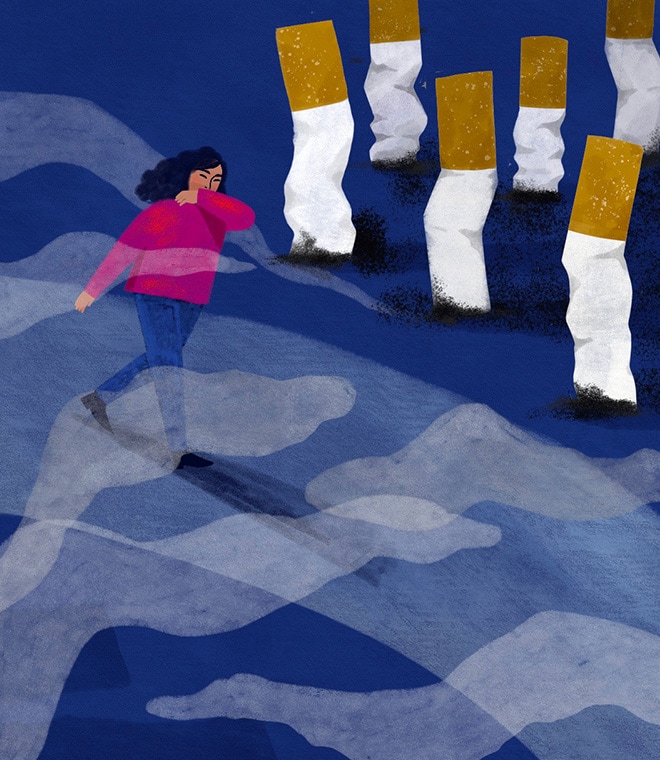Health
Bronchitis vs. Pneumonia: What’s the Difference?
By Dennis Galvon, MD Nov 25, 2024 • 6 min
Bronchitis and pneumonia are two respiratory illnesses that often develop after infections. Although there are some similarities between them, there are many things that differentiate bronchitis from pneumonia.
1. Symptoms: Bronchitis and pneumonia can cause similar symptoms, including:
- Coughing, which may produce yellow or green mucus
- Difficulty breathing
- Fatigue
- Body aches
However, some symptoms, such as rapid heartbeat, confusion, chills and a high fever, occur more commonly with pneumonia. Bronchitis is more commonly associated with a low-grade fever and nasal congestion. It can be very difficult to determine if you have bronchitis, pneumonia, or another respiratory illness, making it important to see your healthcare provider for a diagnosis. A chest X-ray and other tests are often needed to diagnose pneumonia.
2. Causes: Bronchitis (sometimes referred to as a “chest cold”) occurs when the airways that lead to your lungs become inflamed. Acute bronchitis often develops after a viral infection, such as the common cold or the flu. The initial infection symptoms may seem to improve, but then the cough starts, and it can be frequent and disruptive. Symptoms may worsen with exposure to certain irritants like dust, fumes or tobacco smoke. With bronchitis, any mucous the cough produces is typically clear or yellow, thick and sticky. Long-term (chronic) bronchitis lasts for at least three months and can be caused by a respiratory infection. However, people with allergies, familial history of bronchitis, and exposure to tobacco smoke and/or air pollutants have a higher risk of developing bronchitis.
Pneumonia is infection of the lungs, which often causes fluid or pus to accumulate deep in the lungs. The cough is more likely to produce increased amounts of yellow or green mucous. Most often, bacterial pneumonia is caused by Streptococcus pneumoniae or Haemophilus influenza. Atypical or “walking pneumonia” is caused by Chlamydia pneumoniae. Fungal pneumonia is much rarer and is caused by exposure to certain fungi, such as Cryptococcus, Pneumocystis jirovecii and Coccidioides.
3. Treatment: Because the causes of the infections differ, healthcare providers treat pneumonia and bronchitis in different ways.
For mild bronchitis, you may need only a cough syrup, hot tea with honey or a cool mist humidifier. For prolonged cough, which is more severe, your healthcare provider may prescribe:
- Antiviral medications: Depending on the virus, medications like oseltamivir (Tamiflu), zanamivir (Relenza) and peramivir (Rapivab) may help the body fight off the virus, especially when started soon after symptoms begin.
- Inhaled Medications: These prescription medications are inhaled through the mouth, and they may be helpful for easing coughing symptoms.
- Anti-tussives: Over-the-counter and prescription cough suppressants, such as dextromethorphan (Robitussin, DayQuil, PediaCare) or benzonatate (Tessalon Perles, Zonatuss), may be used to reduce coughing and allow you to rest more comfortably.
Treatments for pneumonia will depend on the cause of the infection and may include:
- Antibiotics: Oral antibiotics are necessary for bacterial pneumonia. These medications kill bacteria and allow the body to beat the infection. Inhalers, cough medications, rest and extra fluids are also used.
- Antiviral medications: These drugs may help shorten the duration and severity of viral pneumonia.
- Antifungal medications: These medications are usually prescribed to treat fungal pneumonia.
Pneumonia is still a cause of death in the elderly, the very young and those with a weakened immune system from cancer treatment or other medical conditions. Patients with severe symptoms should see their medical provider promptly or go to the emergency room.
In-hospital treatments may be needed for more severe cases of pneumonia. These treatments include oxygen therapy, medications by nebulizer, intravenous (IV) medications and fluids. In some cases, a surgical procedure is necessary to drain fluid from the lungs.
4. Prevention: Pneumonia and bronchitis can’t be prevented entirely, but you can take steps to reduce your risk of developing both infections.
There are several FDA-approved pneumococcal vaccines to help prevent pneumonia. If you’re at an increased risk for pneumonia based on your age and health history, getting vaccinated can help protect you from the most common causes of the infection.
Getting your flu shot and staying up-to-date on your COVID-19 vaccinations can help with prevention of both bronchitis and pneumonia, even though there isn’t a vaccine specifically for bronchitis. Some additional ways to minimize your risk of both pneumonia and bronchitis include:
- Quitting smoking and avoiding secondhand smoke
- Getting enough sleep
- Following a healthy, well-balanced diet
- Washing your hands frequently with soap and water
- Limiting your contact with people who are sick
Updated November 2024.
Sources:
- https://health.clevelandclinic.org/bronchitis-vs-pneumonia
- https://www.lung.org/lung-health-diseases/lung-disease-lookup/bronchitis/symptoms-diagnosis-treatment
- https://medlineplus.gov/pneumonia.html
- https://my.clevelandclinic.org/health/diseases/3993-bronchitis
- https://my.clevelandclinic.org/health/diseases/4471-pneumonia
- https://www.cdc.gov/pneumococcal/vaccines/index.html
- https://www.lung.org/blog/bronchitis-frequently-asked-questions
- https://www.health.harvard.edu/a_to_z/acute-bronchitis-a-to-z
- https://www.ncbi.nlm.nih.gov/books/NBK513321/
- https://www.uptodate.com/contents/pneumonia-prevention-in-adults-beyond-the-basics/print



